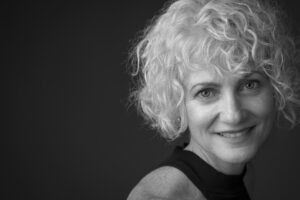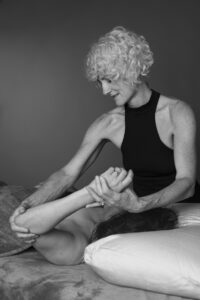
Meet a Holistic OT: Vanessa Hemingway
In our Meet a HOT (Holistic OT) Community Practitioner series, we learn about how our full members incorporating integrative health, wellness, and prevention in their OT practice. Join us as we learn more about this month’s featured practitioner. At HolisticOT.org, we are a community of occupational therapists that incorporate complementary and integrative healthcare into their practice.

Meet Vanessa Hemingway, MS, OTR, CLT-LANA
Vanessa Hemingway is committed to supporting people during and after cancer treatments who have or are at risk for lymphedema to reclaim healthy and vibrant lives. She has been an occupational therapist for over twenty years and a certified lymphedema therapist for more than eighteen, serving post-surgery and cancer clients to transform their pain, tightness, and restriction into increasing freedom, ease and pleasure. Vanessa’s consistent success accelerating each client’s healing journey centers around a profound understanding of the lymphatic system which, like so much of our human lives, if coached and enabled, has a tremendous capacity for repair. She also loves to travel around the globe in search of healing wisdom, indigenous embodiment practices, and dance.
How long have you been practicing occupational therapy?
Since 2001.
What type of setting do you work in?
I have a private practice and also work in a hospital-based outpatient clinic.
What is your specialty?
Lymphedema management.
At what point did you incorporate complementary and integrative health into your OT practice?
In 2010, I started integrating all my movement studies knowledge into my OT practice: my 4-year Feldenkrais training (graduated from Delman Questel in 1999), my integrative bodywork studies (Continuum movement, structural integration deep tissue techniques based on Rolfing, Irene Smith’s Service Through Touch training with the critically ill and dying), my Zen and Vipassana meditation training (2 years of living and working at Zen Mountain Center and Green Gulch Farm as well as multiple 10-day Vipassana retreats with Goenka), and my MFA in Creative Writing from SFSU to help patients open up to healing on all levels of their being.
Which complementary and integrative health approaches do you use in your practice?
 I take a very holistic approach with my patients who are each in different places along their cancer journey, benefitting from different levels of integration and support. Feldenkrais deeply informs my movement practice with patients as I invite them to experience comfortable embodiment again. Women going through breast cancer and breast cancer-related lymphedema who experience increased rates of depression and anxiety, can benefit from meditation, yoga and breathing practices to promote parasympathetic engagement. Essential oils, partaking of beauty in the surroundings (creating an altar or enjoying the altar that is the natural world) and journaling are all supportive practices I include in my offerings.
I take a very holistic approach with my patients who are each in different places along their cancer journey, benefitting from different levels of integration and support. Feldenkrais deeply informs my movement practice with patients as I invite them to experience comfortable embodiment again. Women going through breast cancer and breast cancer-related lymphedema who experience increased rates of depression and anxiety, can benefit from meditation, yoga and breathing practices to promote parasympathetic engagement. Essential oils, partaking of beauty in the surroundings (creating an altar or enjoying the altar that is the natural world) and journaling are all supportive practices I include in my offerings.
How do complementary and integrative health approaches uniquely benefit your clients?
My patients who develop lymphedema during and after cancer treatments are undergoing a profound transformation. For many of them, cancer is the first health crisis of their lives, and lymphedema, a chronic lifelong condition, follows close on its heels.
This incredibly vulnerable opportunity engenders confronting questions:
- How can I take better care of myself?
- How do I begin to put myself first when it has always been my family, my spouse, my children, my work, anything but me first?
- What is meaningful to me?
- After all this damage, what about me is still whole?
Integrative health approaches invite my patients to experience themselves as complete despite being changed; different and still whole. Experiencing the connection of body, mind, and spirit in something as ever-present as the breath gives them an empowered sense of their body’s capacity for healing.
What advice can you offer to occupational therapists looking to incorporate complementary and integrative health care into their practice?
Complementary and integrative health care is a natural for OT’s. My guess is that most OTs are doing this without even knowing it because holism is built into the occupational therapy framework.
The very definition of our work is to look at the whole being in the broadest sense of the word occupation, not simply what occupies us but what brings us joy and purpose:
- our work
- leisure
- social, and
- emotional roles.
Please describe a moment or situation that affirmed your decision to practice OT with complementary and integrative health.
One of my very earliest patients, more than 20 years ago, was experiencing significant pain as a result of late stage 4 breast cancer. I remember readying myself to begin a very gentle lymphatic treatment, my hands still inches above her body, when she asked me to lighten the pressure. That day, I gave her gentle manual drainage for over 30 minutes, from which she reported significant relief, without ever actually touching her physical body with my physical body. This was not a comfortable experience for me. At the time, honestly, terrified might have been the word I would have used to describe my feelings. Nothing in OT school, or any learning I had yet had, prepared me for an understanding of an energy body, mine or anyone else’s. The experience eventually led me to want a deeper, wider, more expansive understanding of human health and healing.
 What do you see in the future for OT with complementary and integrative health and the Holistic OT community?
What do you see in the future for OT with complementary and integrative health and the Holistic OT community?
I see that eventually there will be no distinction between Holistic OT and OT––they will be recognized as one and the same. OT has the blessing of a very wide scope of practice. OT’s love to learn and very few stop their studies with their master’s degree. I see more OTs devising creative ways to study complementary and integrative health so robust findings support their efficacy. As more of us integrate our practices and document the excellent results, our practice shifts. The most recent position paper on Holistic OT supports this.
What is your favorite thing about being a full member of the Holistic OT Community?
Emmy! Your generous free coaching each month, the workshops that always strive to be affordable, the supportive an inspiring community. I love hearing about the ways others are pioneering this approach in our field.
Do you have a favorite quote that inspires you or story you would like to share?
“Let the beauty we love be what we do. There are hundreds of ways to kneel and kiss the ground.”
–Rumi





Leave a Reply